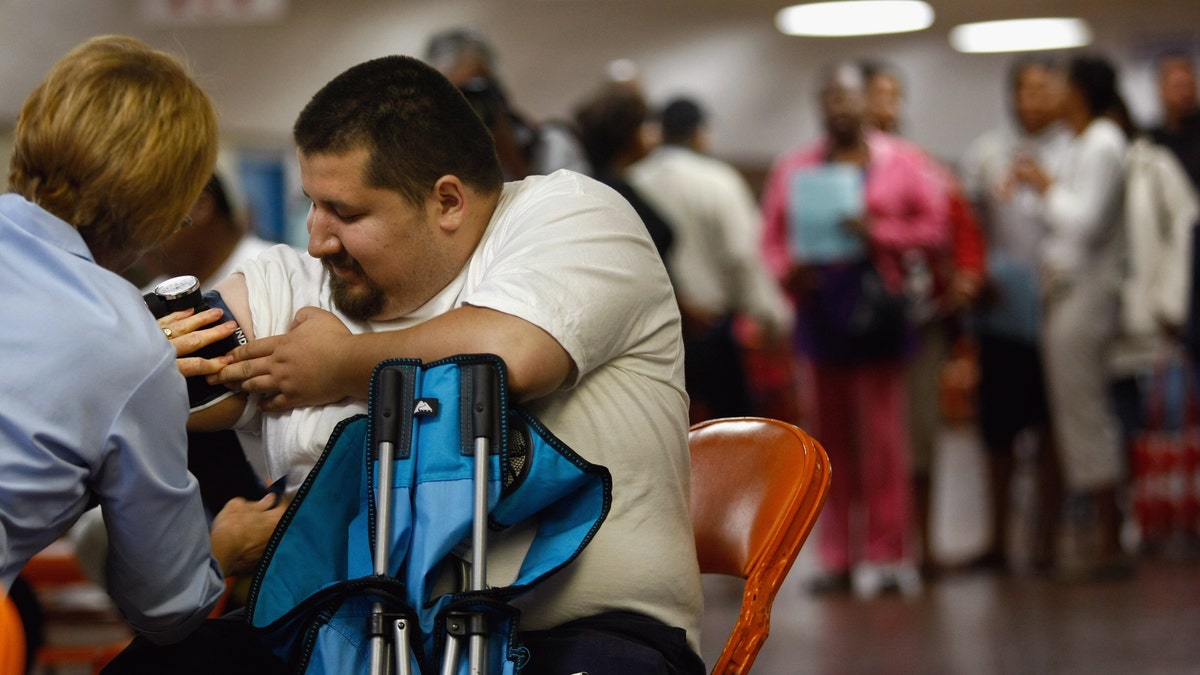
Marza Topete has his blood pressure taken at the Forum arena at a free health clinic on August 11, 2009, in Inglewood, Calif. Hundreds of people, most without health nor dental insurance, waited outside most of the night for the first day of the clinic. (Photo by John Moore/Getty Images) (2009 Getty Images)
SACRAMENTO, Calif. (AP) – About 2.5 million California adults remain uninsured after the first open enrollment period for the new federal health law, and the state will face even bigger challenges in reaching those people, particularly Latinos, according to a survey released Tuesday by a national health policy nonprofit.
In a follow-up to its long-term study of California's uninsured, the Kaiser Family Foundation found that 3.4 million previously uninsured adults now have health coverage after the first open enrollment season under President Barack Obama's health overhaul.
Eight in 10 of the remaining uninsured adults, who are between the ages of 19 and 64, said they are aware of the requirement to buy health insurance, but a majority said they don't have enough information about how the Affordable Care Act would affect them. Many who tried to enroll reported having problems navigating health insurance plans. Others worried about cost.
"It shows that the work just gets harder from here because the uninsured who remain are people who have been uninsured for a very long time and are populations that will be more difficult to reach, including Latinos," said Drew Altman, president and chief executive of Kaiser Family Foundation.
About 62 percent of those who still do not have coverage are Latino, the study found, and nearly half are ineligible for tax subsidies or low-income health programs because they are not legally living in the United States. A third of those who are eligible for subsidies reported concerns that enrolling would affect someone in their family who does not have legal status, despite the Obama administration's assurance that signing up for health care would not lead to deportation.
California's health insurance exchange, Covered California, faced heavy criticism last year for its lackluster efforts to sign up Latinos and problems with its Spanish-language website.
Spokesman James Scullary said Covered California is "doubling down on our enrollment activities," this year, including spending $168 million on outreach in the first three months starting in November, more than it spent in six months last year. The agency is also recruiting more bilingual call center workers, refining its direct mail campaign and sending more enrollment counselors, he said.
He said the exchange adjusted its outreach and marketing campaign to Latinos, boosting its final Latino enrollment in the individual market to 305,106, above its projection of 265,000.
"A lot of what we do in this next open enrollment is a continuation of that because once we made that change in the final few months of our first open enrollment, our enrollment just surged," Scullary said.
Sen. Norma Torres, D-Pomona, who authored a bill to boost diversity on the exchange board in response to low minority enrollment, consumer complaints and a confusing website, said she is hopeful the exchange will do a better job the second time around.
Kaiser's survey underscores that having people from different backgrounds and languages is critical to reaching the uninsured, she said.
"I have been very much involved in ensuring that this very hard-to-reach population is able to have the same opportunities that everyone else has had to enroll or purchase a product that they absolutely need," Torres said.
Among those who gained insurance coverage, the survey found 25 percent are now covered by Medi-Cal, the state's insurance program for the poor, 12 percent moved into employer-sponsored plans, 9 percent bought individual coverage through Covered California and 4 percent through other sources.
David Boughton, 41, of Davis, said he enrolled in Medi-Cal two weeks ago after being denied last year. The former math teacher has gone without steady health coverage since he was laid off in 2008 and hopes to start a new business to care for his wife and two children.
"It's kind of funny. Before I couldn't afford health insurance and I didn't try to get it. Now that I'm forced to get it, even though it was a painful process, I have it," Boughton said. "So I might as well take advantage of it."
Kaiser's survey was based on telephone interviews with 1,218 people between April 1 and June 15.
Follow us on twitter.com/foxnewslatino
Like us at facebook.com/foxnewslatino
